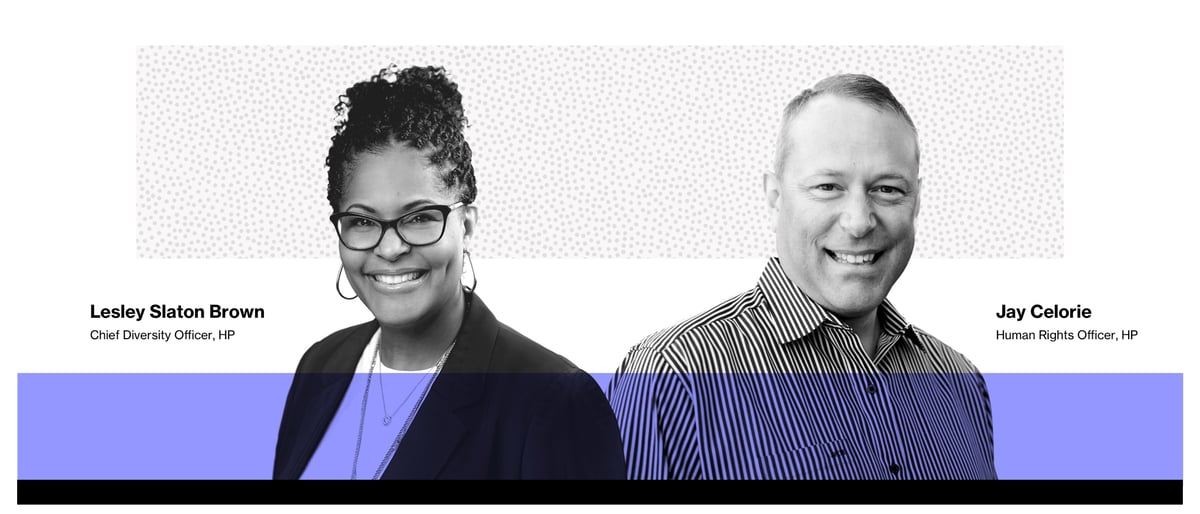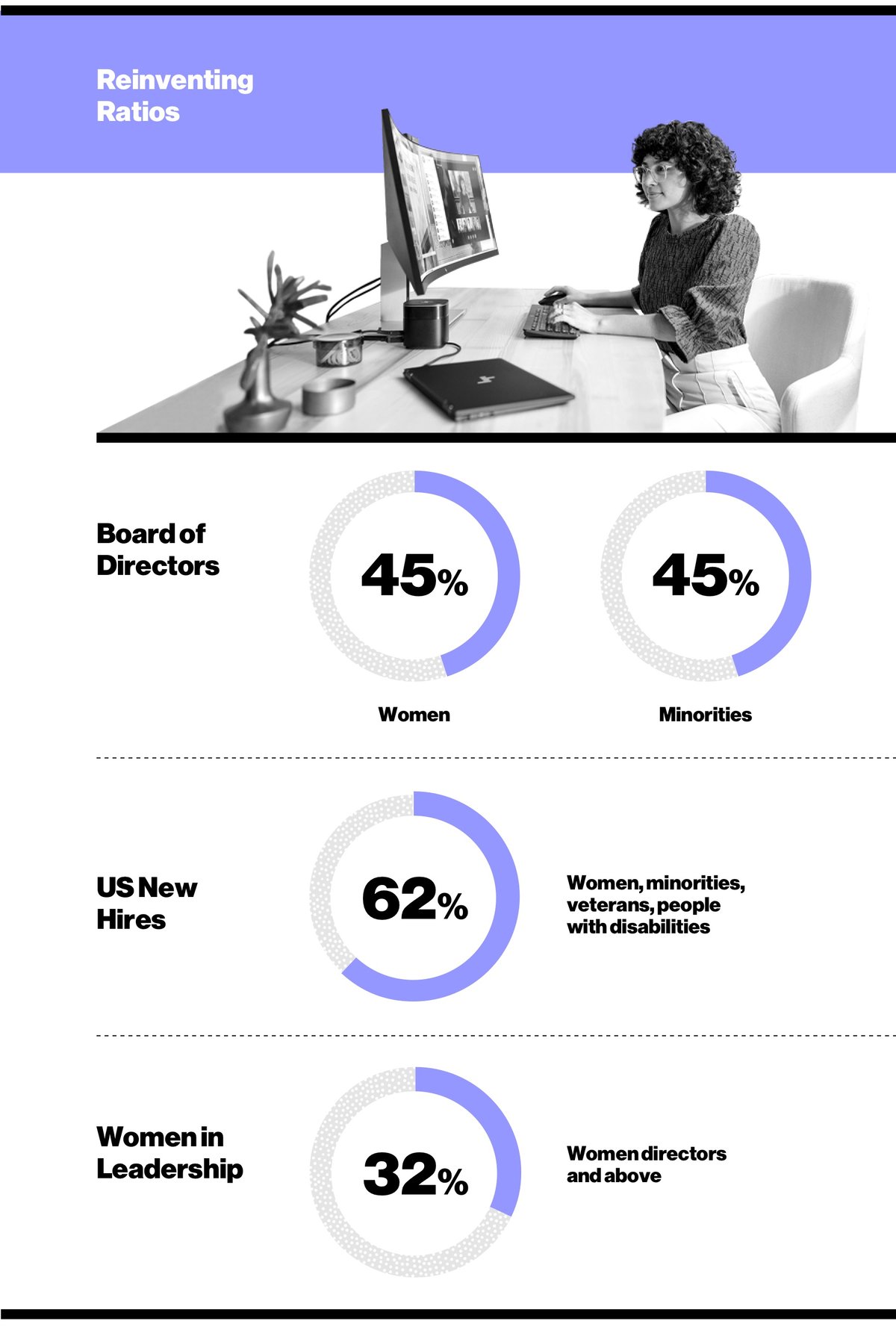
Tech Industry Takes Steps to Increase Racial and Gender Diversity
George Floyd’s murder a year ago prompted historic demonstrations not seen perhaps since the Civil Rights movement of the 1960s. Chief executive officers of hundreds of tech companies made pledges and commitments to aggressively tackle racial and gender inequity within their workforces. Many of them also took action across the wider tech ecosystem in areas that include supplier diversity, Black founder funding, philanthropy, STEM education in Black and Latino communities and investments in historically Black colleges and universities (HBCUs).
A year later, diversity leaders at tech companies are carrying out these bold mandates. HP has long been standing up for underrepresented groups, a value first initiated by its founders, Bill Hewlett and Dave Packard, who started the company out of a Palo Alto, Calif. garage in 1939. Almost from the beginning, the company hired women in non-secretarial roles and minorities in STEM roles.
Fast-forward to today, and HP is leading the tech industry with several bold initiatives to address racial, gender and human rights inequities, guided by the belief that diversity, equity and inclusion (DEI) are business imperatives.
HP’s Chief Diversity Officer, Lesley Slaton Brown, is charged with guiding this agenda. In the aftermath of Floyd’s death, HP held a series of racial equality town halls that gave its Black employees an opportunity to be heard by C-suite leaders. DEI were embedded across the business before 2020’s racial reckoning; in addition to fostering a diverse pipeline internally, HP led first-of-its-kind programs to increase diversity in the legal, marketing and communications industries and is a founding member of CEO Action for Diversity & Inclusion. But the event further expanded the business’s focus on systemic inequality and injustice.
“Some people who haven’t experienced racism and discrimination have a hard time sometimes believing that it happens,” Slaton Brown says. “And we’re not always accustomed in the workplace to really show that vulnerability and share our stories. What the town halls afforded us was the ability to bring front and center some of our employees to share their stories, to share how they’re feeling and share some of the experiences they had.”
Jay Celorie, Human Rights Officer at HP, says that company leaders recognized the importance of doubling down on eradicating systemic racism and inequities that some of their colleagues confront on a daily basis through the personal stories shared at the town hall.
“It allowed people that are in less diverse situations to walk in others’ shoes and have more appreciation and more empathy,” Celorie says. “The workplace offers a real opportunity to learn about underrepresented groups’ struggles and to advance diversity, equity and inclusion because in our private lives, we can often unintentionally be segregated, particularly in different parts of the country.”
Last year, HP announced a goal of doubling the number of Black executives in the company by 2025, and in December, HP joined OneTen, an organization comprised of leading companies that are committed to training, hiring and promoting 1 million African Americans over the next 10 years. Most recently, HP became the first Fortune 100 tech company to commit to gender equality in HP leadership by 2030 as part of its 10-year vision to become the world’s most sustainable and just technology company.

But, for Slaton Brown, advancing DEI at HP requires more than just increasing the number of diverse employees.
“We believe diversity drives innovation, and the investment in that goes beyond just attracting diverse audiences, but looking at how you go from attracting to hiring, to retaining, to promoting,” Slaton Brown says. “And then that goes even further from just our employees, to the vendors, the suppliers and the partners that we have globally. It’s a more holistic approach to what we’re doing for diversity, equity and inclusion.”
HP partners with HBCUs on the annual HBCU Business Challenge, which is designed to engage Black students in careers in business and technology. In the program, students network with HP leaders and learn practical business skill sets to help them kick-start their careers.
“The coaches are mentoring the students and the students are mentoring the coaches, as well,” Slaton Brown says. “So it’s a reverse mentorship type of opportunity. We can’t say just because we work in corporate that we know it all. We need to learn from these students that are, in most cases, coming from different cultures, from different backgrounds, with different learning experiences. And as leaders, we grow from that, as well.”
In addition to hosting the annual HBCU Business Challenge, HP provided financial support for HBCUs during the Covid-19 pandemic and implemented a pilot learning program focused on 3D printing at North Carolina A&T.
For nearly 20 years, the company has been taking tangible steps to respect human rights; in 2002, HP signed the UN Global Compact that encouraged businesses to adopt sustainable and socially responsible policies, and the company established its Human Rights office in 2011. Aside from its gender and racial equality goals, HP pledges to empower 1 million workers in the supply chain through its worker empowerment programs.
“Our goal is to empower workers in the supply chain with training and personal development, enabling their voices to be heard and assuring that their labor-related human rights are respected,” Celorie says. “And we believe that by doing all of that work, it’s above and beyond the typical risk management approach, which will help us build a more transparent and resilient supply chain and exceed customer and investor expectations. We’re confident our efforts will create long-term stability and growth for the company.”
Ultimately, the purpose is not to keep score of diversity trends.
“We respond because we care about humanity,” Slaton Brown says. Reflecting with some satisfaction on the town halls that came after the death of George Floyd, she says, “I walked away seeing that humanity wins. And as a global business, we have a role in helping to solve society’s pressing problems in order to carry out our mission to create technology that makes life better for everyone, everywhere.”
